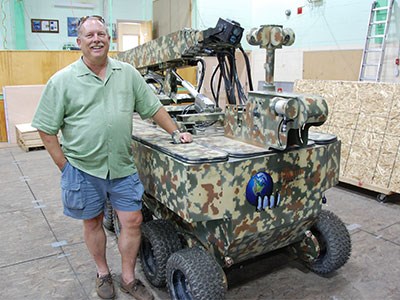Sudbury's largest mining companies, Vale and Glencore, lack innovation, says the chairman of a local mining robotics and technology company.
“I do absolutely no work in this city. I wouldn't want to and I don't need to,” said Greg Baiden, chairman and CEO of Penguin Automated Systems, a Sudbury-based mining supply and services company that specializes in advanced robotics, data communications technologies and positioning systems. “I don't do it because I don't find the people in the mining companies here very innovative.”
Penguin Automated Systems has instead relied on work with mining companies in South Africa and South America to solve specific and complex problems with advanced technologies.
The company also has contracts with the United States' State Department, and with NASA, to explore ways to mine in space.
Baiden made the comments at the launch of the 2014 Greater Sudbury Vital Signs report Oct. 7.
The report is an annual check-up on how the city is performing in a number of areas, including the economy, the environment, education, health and wellness, and housing.
This year, the report had a special section on mining innovation, and Baiden, along with other industry experts, was invited to speak on the topic in a panel discussion.
His comments conflicted with the report's conclusions, which paid special attention to the efforts both Vale and Glencore made to improve their sulphur dioxide outputs.
In 2013, the emission of sulphur dioxide from Vale was 151.9 kilotonnes, a decrease of 92.4 per cent from 2,000 kilotonnes in 1970.
Similarly, the emission of sulphur dioxide from Glencore in 2013 was 26.3 kilotonnes, a decrease of 92.3 per cent from 340.0 kilotonnes in 1970.
The report also cited Vale's ongoing Clean AER Project and its $1-billion investment to retrofit its smelter operations in Sudbury.
As of 2014, Glencore has also announced it will spend $400 million to upgrade Greater Sudbury’s Falconbridge smelter to meet the new provincial air quality standards, under Ontario Regulation 419/05, which will take effect in July, 2016.
But Baiden said both companies did not improve their emissions standards by choice.
“That was legislated. They were told to do that,” he said. “If you don't do that you're going out of business.”
But despite his criticism, Baiden said Glencore is doing great research on its process side.
And he had great praise for many of the smaller companies that make up Sudbury's mining supply and services sector.
“Smaller companies are being extremely innovative because they have to be in order to stay in business,” he said. “We have some bring spots.”
The biggest advantage of being based in Sudbury, he said, is easy access to mining supply and service companies in the region and their expertise.
Don Duval, the CEO of the Northern Centre for Advanced Technology (NORCAT), also sat on the mining innovation panel, and while less critical than Baiden, said investments in innovation, across all sectors in Canada, have decreased since the 2008 recession.
He said local mining research organizations, such as the Mining Innovation Rehabilitation and Applied Research Corporation, or MIRARCO and the Centre for Excellence in Mining Innovation (CEMI), have done excellent work in spite of limited support from the public and private sectors.
Duval said NORCAT has helped foster a number of small and medium-sized enterprises that prove mining innovation is alive and well in Sudbury.
Many of the companies growing through NORCAT's Innovation Mill program combine mining knowledge with other disciplines, such as health care or clean technologies.
Brian Jones, CEMI's vice-president of business innovation, commended Sudbury's mining cluster, which he called one of the strongest in the world.
He also commended Inco and Falconbridge for the efforts they undertook to improve their emissions standards from the 1970s to the present.
“You could taste the sulphur as you were playing,” he said about his childhood growing up in New Sudbury in the 1960s.
Kirk Petroski, the president and CEO of Symboticware, a local company that develops advanced software solutions for mining companies, said the mining sector has traditionally been a slow adopter of new technologies.
“We're still dealing with processes that are very slow to respond to some of the opportunities technology can provide these companies,” he said.
Symboticware also works with companies in Alberta's petroleum sector, where Petroski said companies adopt new technologies more readily and quickly, than in the mining sector.
“I'm not saying there isn't that here (in mining), but the sales cycle is just so much more accelerated down there,” he said.




